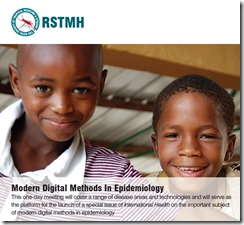How can technology help us to understand and manage disease?
The range of emotions that surface when we talk about diseases such as Ebola, Malaria and Polio is enormous. Seeing images of suited healthcare heroes in West Africa is both heart-wrenching and inspiring. The need to work together to bring our collective skills, resources, and energy to bear is more urgent than ever before. We can all play our part in helping and, as researchers and technologists, we have the advantage that the pace of progress in methods and digital capabilities is advancing rapidly. A key event to bring people together is the the upcoming workshop on Modern Digital Methods in Epidemiology organised by the Royal Society of Tropical Medicine and Hygiene (RSTMH) as disease modelling, genomics, and population mapping, can be further developed to help us to understand, mitigate and plan for current and future disease outbreaks. Gerri McHugh, Chief Executive of RSTMH, explains, “We are delighted to have support from Microsoft Research for this meeting; technology such as that provided by Microsoft Research is increasingly important in the epidemiology of the diseases we and our collaborators are working on.”
Microsoft Research is committed to helping. In December 2014 we convened experts and policy-makers in Cairo to discuss how the global community can work together to better use technology to fight Ebola in the short- and long-term. We are keen to support any researchers who can make use of cloud computing for their work around Ebola. We know there is no quick fix, but we want to help in focussing efforts that can make a difference. Dr Matthew Smith, scientist from Microsoft Research Cambridge (UK) will be giving a talk on Real-time mechanistic prediction of epidemiological dynamics, in the cloud and on devices.
Professor Andy Tatem at the University of Southampton, director of the WorldPop demographic mapping program and a co-director of the Flowminder Foundation, describes some of the possibilities that lie ahead; “The ability to map populations at high resolution is making a real difference to what we can achieve in epidemiology. As we scale-up our work, it is critical that we can respond to the ever-increasing demands to be able to process and distribute population mapping data rapidly where it is most needed. We are excited by the opportunities that cloud computing with Microsoft Azure opens up to help us to be more responsive than ever as our work becomes more and more relevant across an increasing number of areas.”
We look forward to seeing you in in London on the 30th March, and feel free to email us if you would like to discuss how we can work with you.
Learn more:
